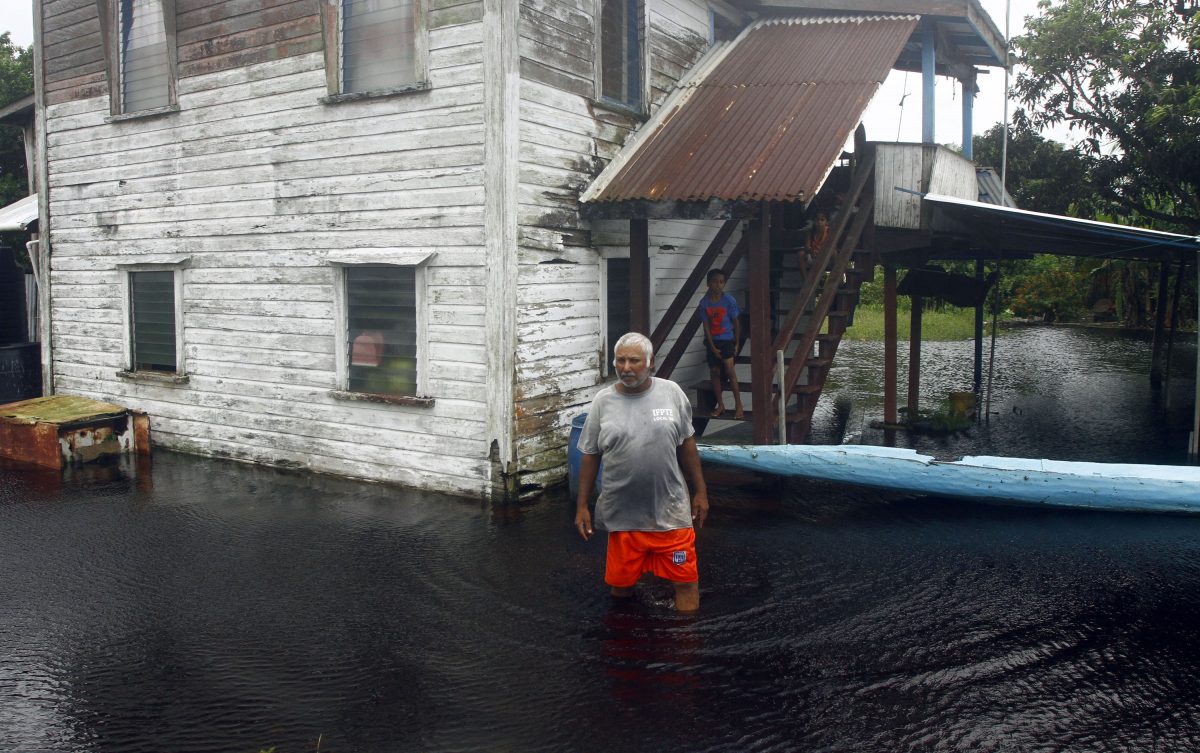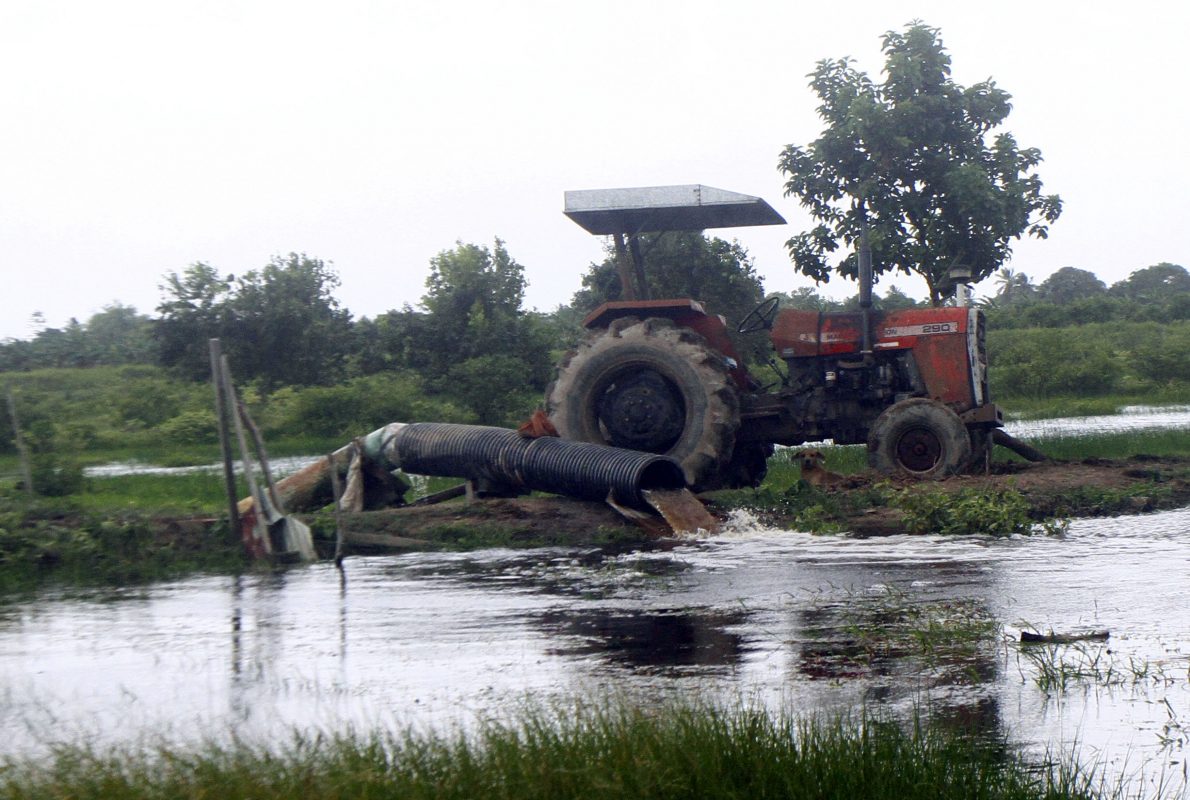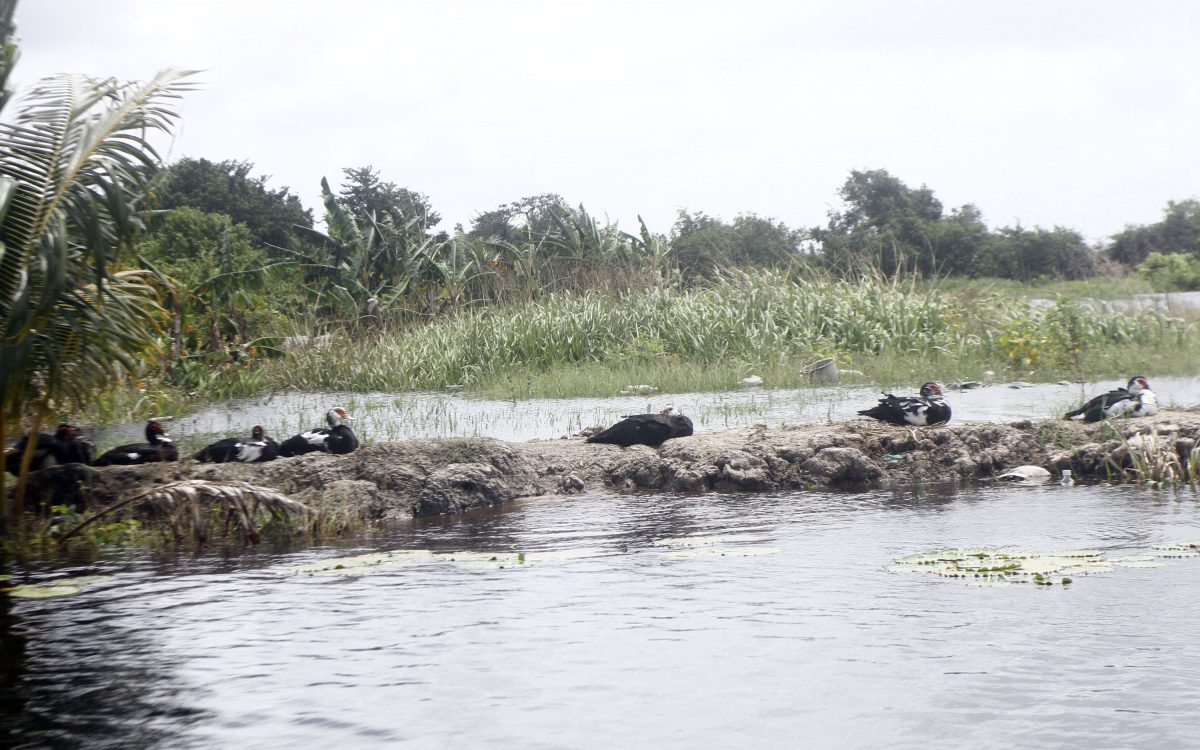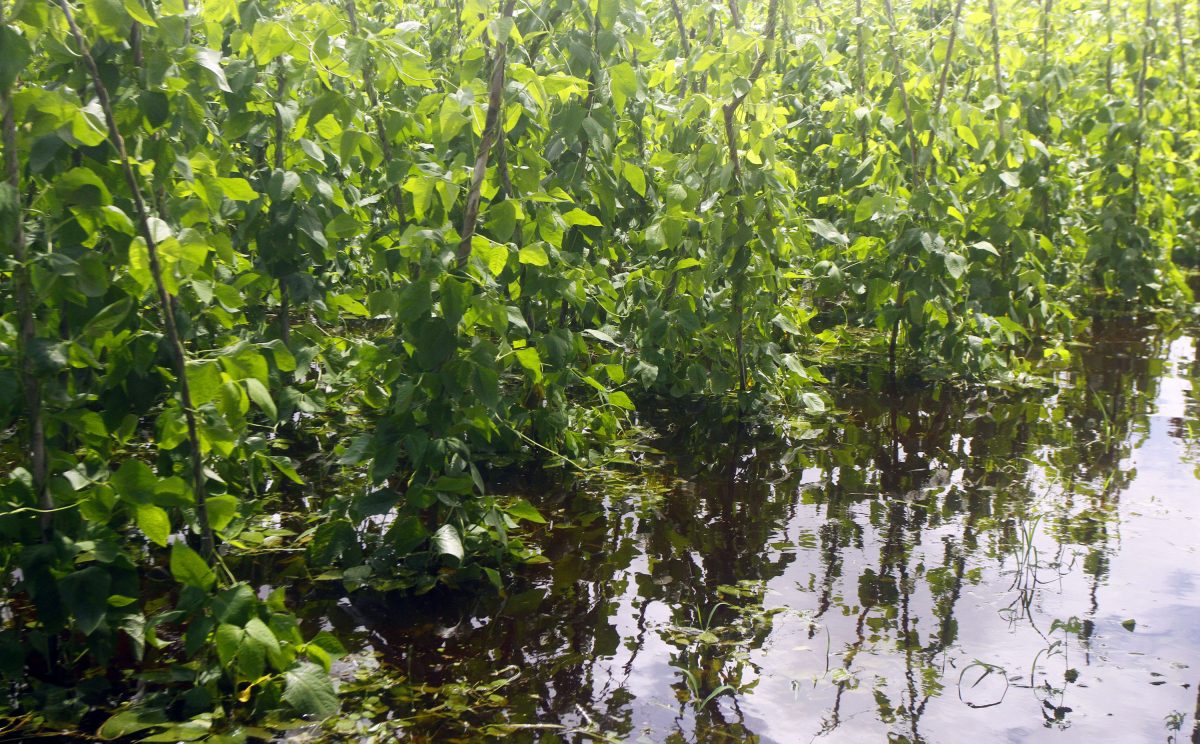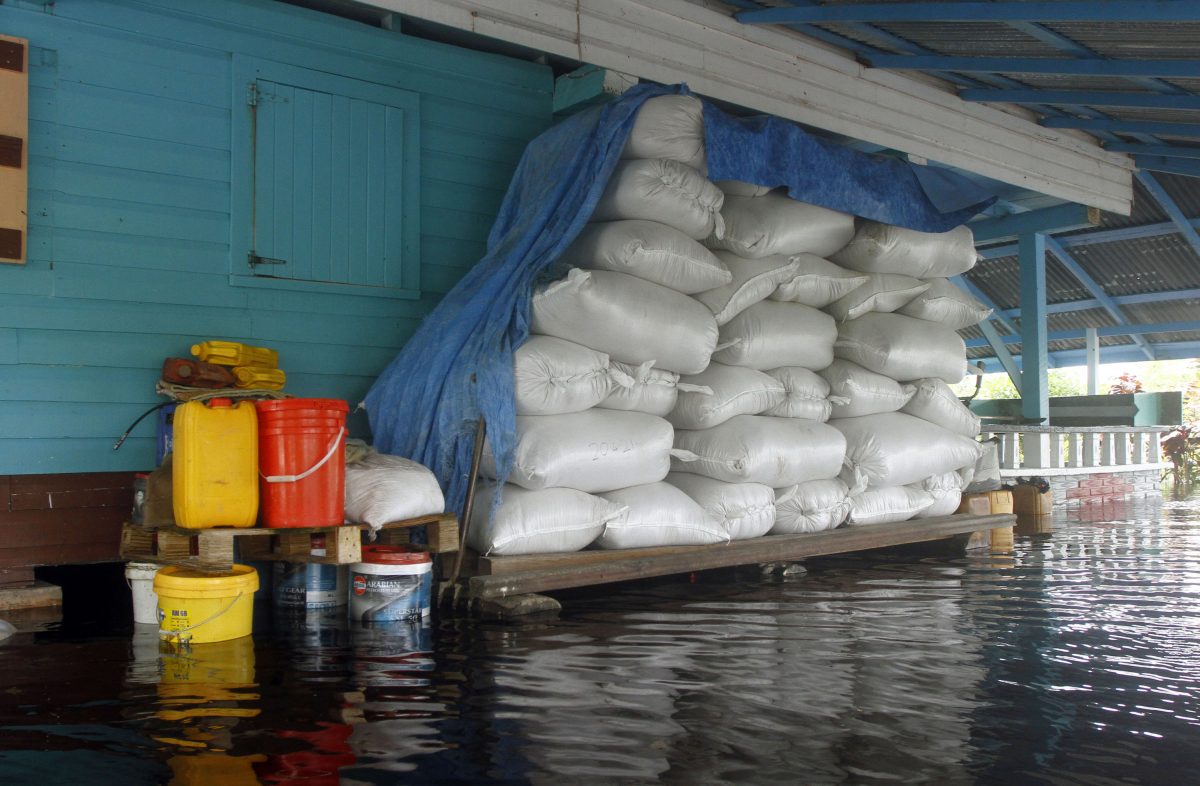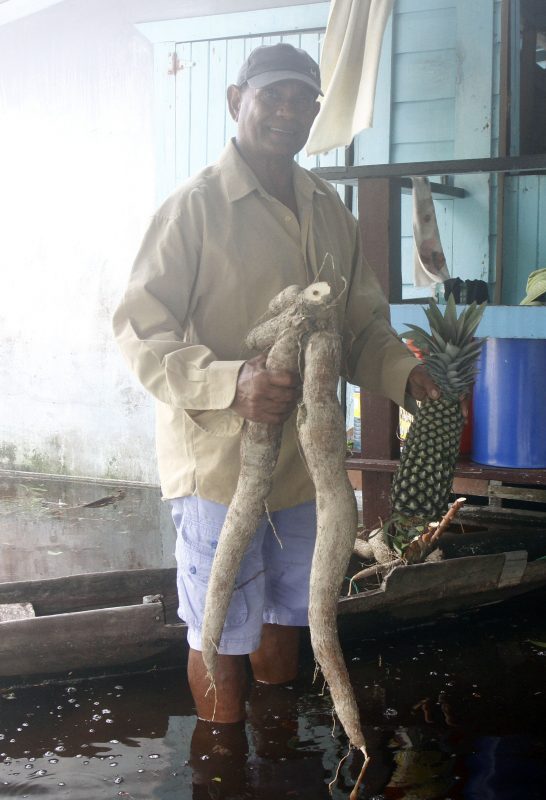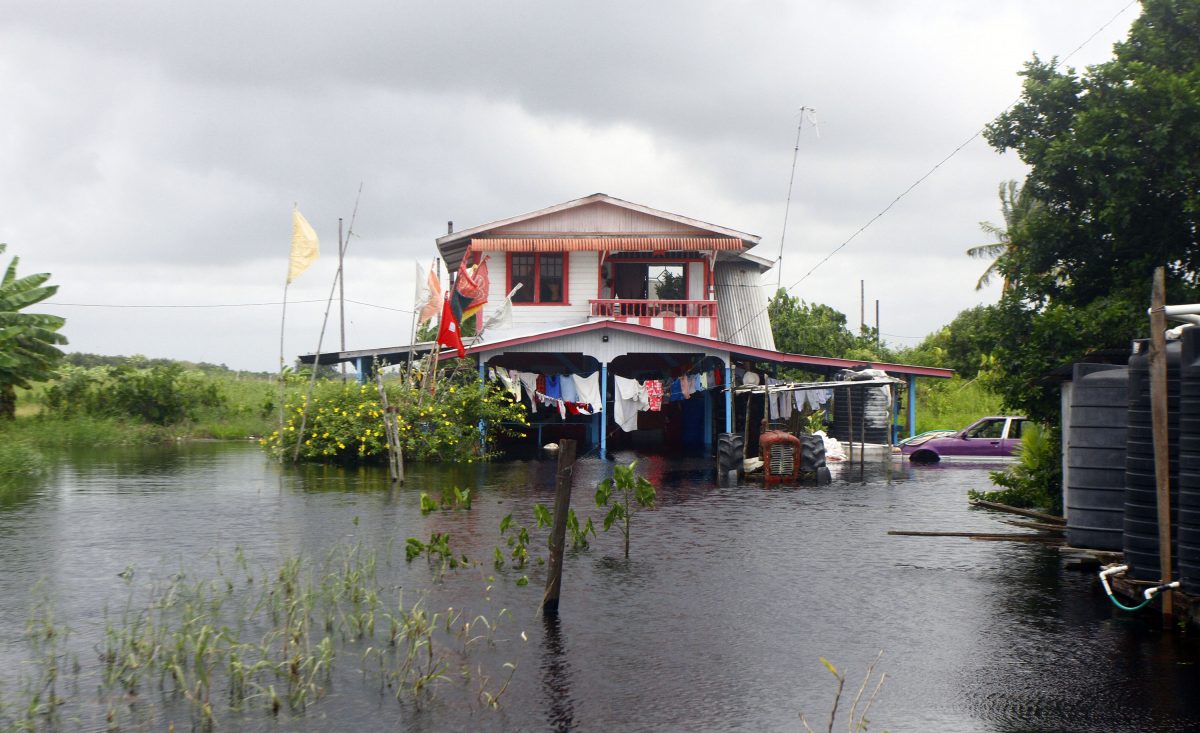Frustration continued to grow yesterday among farmers of Grass Hook and Big Biaboo, Mahaica River, as floodwater continues to rise, threatening the survival of their remaining crops and livestock.
Since Sunday water levels in the villages have continued to steadily rise even as government and privately-owned irrigation pumps work overtime to bring relief.
Swollen from rains, the Mahaica River has overflowed its banks and water has seeped into farms and homesteads, forcing families to remain in the upper flats of their homes. Water levels measured between four and six inches yesterday during a visit by Stabroek News to the area.
Water has been on the farms for just over two weeks and many farmers are struggling to cope. With their investments in the hundreds of thousands of dollars, they are worried about what will happen mainly to their cash crops.
In Grass Hook, Indiyal Ramdeen and his two brothers plant the largest bora farm in the communities and have over 6000 plants budding. “We don’t know what will happen this crop because the water keep raising. Yesterday within five minutes we get in the house. Now all the plants are ducked,” he explained.
At the current market price for bora, Ramdeen estimates their losses to be close to $1 million.
“We have other crops, like sweet pepper and tomatoes, but we have reaped from that already and it’s in final bearing but we don’t know what we will do if all these bora plants die,” he stated before adding that the flooding situation has been terrible for them.
Other bora farmers’ shared similar tales of woe. One farmer said he has invested close to $100,000 to plant about 2,500 plants.
“We have invested so much. In the backdam, all the farms are flooded. Home here, the gardens are flooded. We don’t know what will happen,” Ramnarine Bisoondyal said.
He called on government to lend support to farmers by providing long boom excavators to empolder and raise the earthen barriers around farms to limit the flooding in the future. “We have seen how high this water has come, so if they can come and raise it a 2 feet more or so, that will work. We won’t get a complete wipeout if a next flooding comes,” he added.
Apart from cash crops, the survival of rice, ground provision and bearing fruit trees is also threatened.
Another farmer, Sugrim, whose main produce is rice, said for this crop he invested in 400 roots of cassava and now that it is time to reap he is unable to do so.
Holding a large root, which is considered overgrown on the local market, the farmer explained that with the high water levels and the farms waterlogged he cannot reap and some roots have started to rot.
Over in Big Biaboo, the situation is the same. The farmers there have come to the conclusion that they can only sit and wait until the floodwaters have receded to salvage whatever they can.
During this newspaper’s visit to the area yesterday, a farmer, Rishi, explained that there isn’t much that can be done.
Sitting on a dry post under his waterlogged home, he pointed to his farm, which has 2,000 bora plants under water that he said is knee high.
“They are young plants that haven’t started to bear as yet. Some are flowering but don’t have anything to reap as yet,” he said before explaining that hardship is upon his family as he will not have the required cash flow to spring back into cultivation after the floods.
The current flooding is said to be the third worst for the decade. Last year’s flooding, which was less impactful, did not prepare them for this situation, farmers said.
Rishi Ramdass, who cultivates plantains, cassava and other cash crops, said he has been recording losses every time he visits his farm.
“The plantain suckers are falling down, they are losing grip because the water is so much in the farms. If the plants are not falling the young shoots are falling off. I have cassavas to reap but I cannot because of how high the water is. We have pears also but that don’t like see water so I don’t know if we will get anything from that,” he lamented.
Rice farmers
Just a few days ago, Maldeo Tillack and sons began planting for the current crop season. When they made the decision to begin cultivation, their rice lands were in a suitable condition and they had no signs that the rice lands would be flooded.
However, excessive rain and rising water came and changed their luck, leaving them to ponder what will happen to their thirty acres under cultivation.
“Since Saturday we have been using tractors to pump water out of the rice lands and we still cannot see any dirt… that is over three drums of fuel we have already used up… this flooding has affected us tremendously,” he explained.
Every drum of fuel is purchased at a cost of $41,000 and is split between two tractors used to power the irrigation pumps. But Tillack said they are continuing to hope for the best because they solely depend on rice like Sugrim.
Sugrim explained that he was in the process of land preparation when the floods hit. Finding humour in the situation, he said he cruised around in his boat yesterday morning and measured the height of water in his rice fields.
He noted that should the flooding and rains continue he will not proceed to plant for this crop season. At the moment, he is forced to sell his seed paddy, which had to be taken to higher ground as the water keeps rising.
Additionally, he said he was lucky to reap his last crop, which ended in April, as the rains started right after.
He, too, called on government to deploy excavators to communities to construct embankments around farmlands to reduce the risk of overtopping.
“If they build up the dams and the embankments, we will be able to save some of our crops. If not this flood, any other. Also if they move the pumps and bring it to the centre of the village, it will help to drain the water faster because it will be pulling from two ends and not one,” he suggested.
Even though Tillack agreed with the suggestion, he recommended that they bring a larger pump to drain water from farms and yards.
Notably, several of the farmers said that those who have been severely affected, particularly the cash crop farmers, will need assistance with foodstuff and other items if the situation continues.
Promises!
According to Indira Ramdeen, when the water started to rise she was barely able to get her appliances to higher ground.
“Look all meh kitchen flood. We don’t know where this water come from but it come and flood out the whole yard and me bottom house. We can’t stay downstairs,” she lamented.
Another housewife explained that when the water began rising on Sunday, it was as if there was an opening somewhere as the water came rushing in.
“This water came with waves and within five minutes the entire place was flooded and it still keep coming up,” she said.
Meanwhile, the residents complained bitterly of not seeing any regional authorities visiting their communities to conduct a full assessment. They stated that on Sunday Regional Chairman Vickchand Ramphal visited up to the Big Biaboo Bridge but did not check on their situation.
Further the residents said they have to keep calling the Mahaica,Mahaicony,Abary-Agricultural Development Authority to report on flooding despite the fact that it has deployed pumps to the area.
They also said that from past experiences, promises of assistance are made to farmers but delivering on them is delayed.
“Many times farmers have to invest and rent excavators and get it done and then they send the machines that we need. Yesterday (Sunday) we fetch about 300 bags of mud and carrying around the farms to build up area that was weak then the excavator come and cap off the parts we didn’t get to… it shouldn’t be like this man. The minister is telling them to do things to help us and they are not following through so it’s just promises! Promises!” a farmer vented.
Farmers also said much of their cattle has been forced to find dry ground and have been sleeping on the dams around farm lands. The farmers said the lands are not enough.
